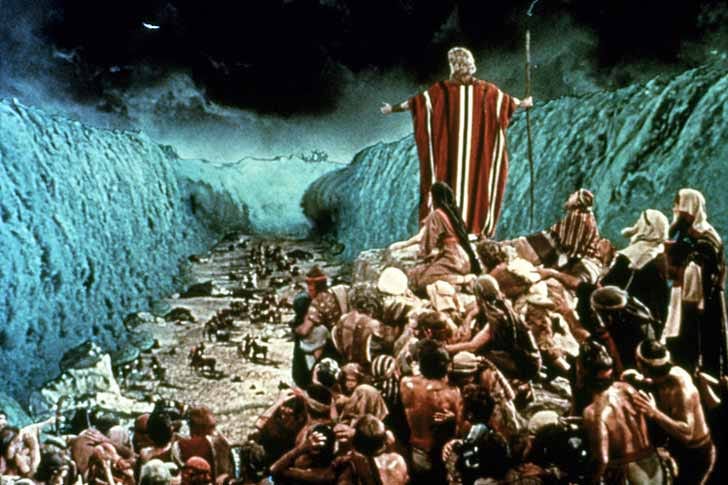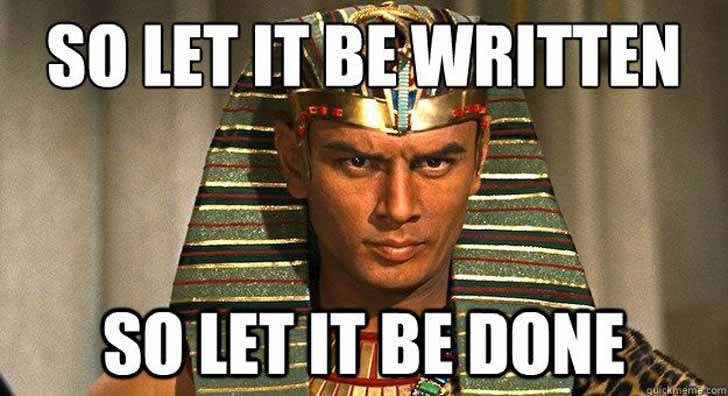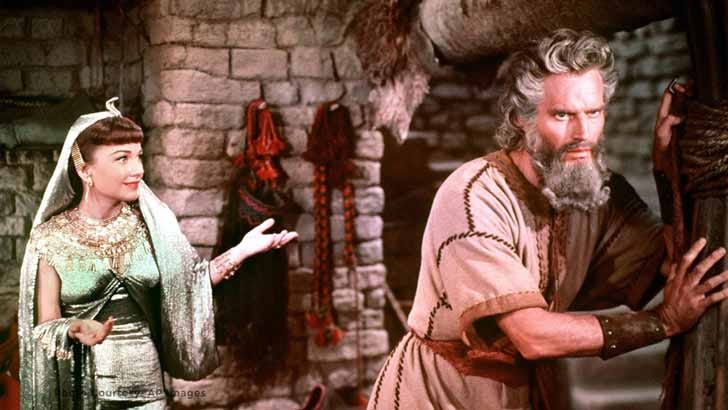My name is Moshe
Between – names, roomies, Charlton Heston, miracles, fire signs, bible studies, mixed-race, SPAM, expectations, matzah pizza
This is the first in a five-part series about each of my five names.
There is one thing I have brought everywhere with me since the day I was born, and that is my name. You would think that after spending all that time together, I might know every single detail about my name. Me and my name – we’d be besties.
Not the case. If my name were indeed a person, we’d be less like besties, and more like roomies. Sure! We get along. Enough to help each other carry furniture up the stairs. But when was the last time we actually hung out?
Tomorrow is my birthday. For this one, I feel compelled to reflect on the name I was given when I was born. I was actually given five names – a first, a middle, a last, and two in Hebrew. They are: Dylan, Rosal, Greif, Hillel, and Moshe. For all the time I have been with these names, I feel like I haven’t given them enough of my attention, care, and gratitude. What universes exist within each one? How might I find myself anew within them?
This month, instead of writing one long newsletter post, I am writing a series of five short ones – each about one of my names – which I’ll send about a week apart. Today’s newsletter explores my second Hebrew name. Moshe.
Moshe (mo-SHEH)
I start with Moshe because on this day 38 years ago – the day before I was born – something happened to my parents that inspired them to give me this name. Picture them now, sitting at home.
What happened next was a scene out of a movie. Oscar-winning. I mean this quite literally. Airing on television was the 1957 production of The Ten Commandments. The film stars a young, strapping, pre-NRA Charlton Heston as Moses — or Moshe, in the original Hebrew. It wasn’t unusual for The Ten Commandments to air around this time of year. It was Passover. In fact, tonight is Passover. And the movie is probably airing or streaming this weekend. Here’s the schedule.
The big scene finally plays on the television. The scene that won the film an Academy Award for Best Visual Effects. The Hebrew people, who had been enslaved in Egypt for hundreds of years, have escaped, but are being chased by Pharaoh’s army. They reach a dead end at the banks of the Red Sea. They seem to be trapped. Until, by the hand of God, Moshe splits the Red Sea in two, clearing a path for the Hebrew people to flee.

It was at this very moment, when Moshe broke the Red Sea in two, that my mom’s water broke.
This cosmic alignment – between my birth and The Ten Commandments and Passover and me and Charlton Heston – simply could not be ignored. My parents had already picked out my four other names. They added Moshe to the end of it.

I am proud to have Moshe as one of my names. But a part of me feels like I couldn’t possibly live up to this larger-than-life character I was named after. My good friends, meanwhile, named their baby Moses, straight-up. I wonder how he’s going to handle it. Judging by the evidence below, probably very well.
It makes me wonder if there is something cosmically mis-aligned about my bearing the name Moshe. Not to get Jewistically astrological, but I was born an Aries, a fire sign. Everything about Moshe signals water. There is the parting of the Red Sea. There is the fact that as a newborn baby, Moshe’s mother saves his life by putting him in a basket that she sends down the Nile, hoping that from the water, he will be rescued. In fact, the word “moshe” is a verb that means “to pick up something out of the water.” As a man, he would eventually exhibit the power to turn the Nile water into blood, and later, to cause a fountain to spring from a desert rock. Meanwhile, we see Moshe and fire not mixing well at all. As a child, he burns his tongue on fiery coals, causing him to have a speech impediment for the rest of his life.
Maybe it was a mistake that I was named Moshe. Then again, my first name, Dylan, happens to have the same exact meaning as Moshe. It’s Welsh for “comes from the sea.” It would seem there is no escaping it. I appear to have a mixed-element identity. Half-fire, half-water. And it’s confusing. But it also makes sense. After all, I am mixed-race, too. Half-asian, half-white. Or to be more exact, half-filipino, half-what-do-I-even-call-it, Eastern European? Of Austro-Hungarian descent? What-would-now-be-Ukrainian-and-I-pray-will-remain-so? But with a German last name? How about just son of a dad from New Jersey?
The funny thing is, the O.G. Moshe is mixed-identity, too. Moshe himself struggles to live up to the larger-than-life character he is slated to become. Born into slavery, and then sent floating down the Nile, the baby is fortuitously discovered by one of Pharaoh’s daughters. She hides the fact that he is of Hebrew descent, and raises him as her very own, among Egyptian royalty.
Moshe is torn when he eventually learns he was a Hebrew all along. Talk about imposter syndrome. Egyptian – except not really Egyptian. Not Jewish, except – really Jewish. Both the enslaver… and the enslaved.

That kind of thing can drive a person psycho. And in my loose reading of the story, it does. The man goes off the grid in faraway Midian. He marries and has a son he names Gershom, which is basically the Hebrew word for alien, for “I have become an alien in a foreign land,” he says. One day, he ambles up a desert mountain, hears what he thinks is a burning bush talking to him, and follows its direction to revolt against the Egyptian government. Like I said. Psycho.
And I can’t blame him. Growing up in an insular white Jewish community, it took me until I was an adult to really internalize the fact that I actually looked different. I always knew on a certain level. There was that time in the 5th grade, for example, when Joshua Levin spotted an Indian kindergarten boy running on the blacktop, and joked, “Hey look, it’s little Dylan!” I knew what was up, but I didn’t quite accept it.
Meanwhile, when my Filipino family threw parties, it was always a blast, but I always felt on the edge of our traditions. My siblings and I weren’t Catholic like our cousins, so we skipped their trips to church, and didn’t ask questions about the many Jesus statues on the shelves and the walls. I tended to avoid Filipino food, opting instead for bread and butter. My brother too. Our titas (aunts) called us “the bread and butter boys.” When we played white elephant on Christmas, I didn’t understand all the excitement about that one gift of SPAM. Why did some people not want it, while others desperately did want it? Was it a good gift or a bad gift? I just didn’t get it at the time.
In Exodus, after Moshe sacrifices everything to free the Hebrew people, he never really becomes a true member of the tribe. They all wander through sand for 40 years, and when they finally reach the promised land, God doesn’t let Moshe go in with them. Moshe stays back in the desert, where he dies alone. But the people – they make it. Well, they make progress, at least.
Maybe, the story of Exodus is not just a story about the liberation of the Hebrew people. Maybe it’s about how we all try to live up to our own expectations, when in fact, we have selves that are divided and contradictory. Maybe it’s about how living up to our own expectations is practically impossible, and about how that’s okay. Maybe it’s a story about how we move forward as best we can anyway. About how we do what we do just to find a way forward. Whether that way is in a basket floating down a river, or on a stretch of dry land at the bottom of the sea.
Tomorrow on my birthday, I’ll be channeling my inner Moshe. I used to be a little down about having a birthday on Passover, because on Passover, you’re not supposed to eat anything related to bread. This meant no cake on my birthday. Much worse, it meant no pizza for my birthday parties. We made matzah pizza in the toaster instead, and it kind of wasn’t great. This year, in Hawaii, I’m having friends over for dinner on my birthday. I don’t keep kosher for Passover, and none of them are Jewish, but matzah pizza is what I’ll be serving. I’ll do this not because I want to relive my childhood birthday traumas. I’ll do this because, over the years, I figured out my own special way to make matzah pizza taste pretty F-ing good. And because, as it stands, matzah pizza is a part of who I am. It is what makes me me. I would like to share it with the new friends I have made.








